Eleonora Gallitelli was awarded a PhD in Comparative Literature at IULM University, Milan, for a thesis on the early Italian translations of works by Dickens, Faulkner and Rushdie, where she combined the methodologies of corpus linguistics and close reading. In this post, she identifies the different meanings that the vocabulary of affection assumes for the main characters of Middlemarch, showing how this reveals the true nature of their romantic relationships.
Readers of George Eliot’s Middlemarch will be aware that sympathy is the feeling with which it is most urgently concerned. Eliot conceives of the major benefit of the novel form in general as “the extension of our sympathies”, since art, she famously writes in her essay ‘The Natural History of German Life’, is “a mode of amplifying experience and extending our contact with our fellow-men beyond the bounds of our personal lot” (1856: 54).

The idea of sympathy occurs for the first time in the novel in the form of an adjective in free indirect discourse, but in a negative formulation, referring to Dorothea Brooke’s unsuitable attitude towards marriage:
But perhaps no persons then living – certainly none in the neighborhood of Tipton – would have had a sympathetic understanding for the dreams of a girl whose notions about marriage took their color entirely from an exalted enthusiasm about the ends of life, an enthusiasm which was lit chiefly by its own fire […]
This excerpt is preceded by another general statement about Dorothea; after describing her “plain dress”, religious fervour and theoretical mind, the narrator observes:
Certainly such elements in the character of a marriageable girl tended to interfere with her lot, and hinder it from being decided according to custom, by good looks, vanity, and merely canine affection.
More than sympathy, which, the narrator has told us, is not always felt, it is the nature of their affections that helps us position Eliot’s characters in the particular world of feeling she creates in Middlemarch, and understand their ideals, choices and failures. The word affection here has the meaning of “Favourable or kindly disposition towards a person or thing; fondness, tenderness; goodwill, warmth of attachment”, but, “Esp. in early use also more strongly”, it served as another word for “†love (for another person) (obsolete)” (OED, n. 1, I., 2., a). When searched as a wildcard (thus including words like affections, affectionate, affectionateness and affectionately), it occurs 61 times in the novel (Fig. 2). In this blog post, I will take a closer look at the textual context of these occurrences. I am particularly interested in the ways in which such context can provide insight into the relationships of the principal couples in the novel.
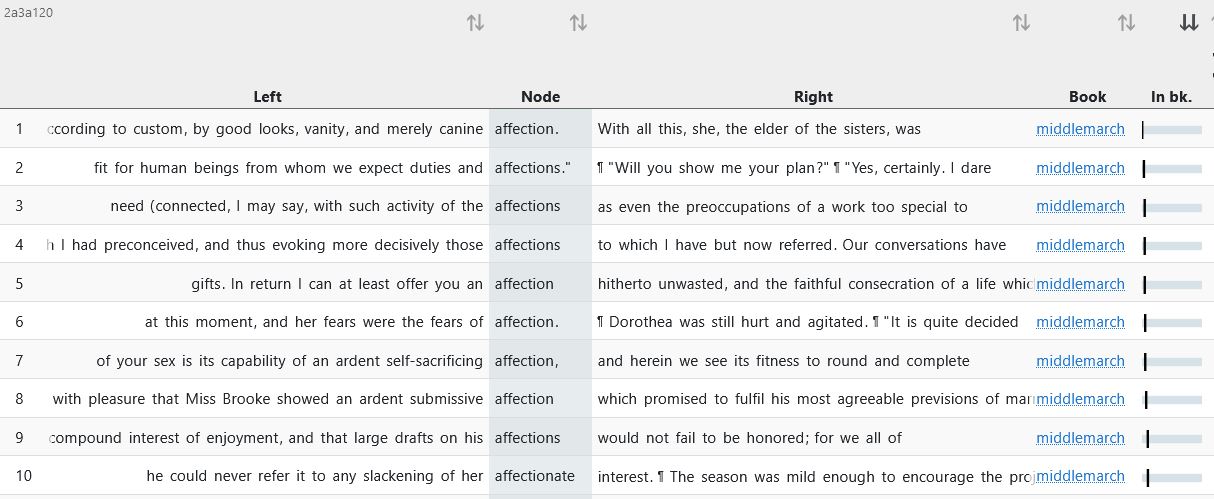
Mr and Mrs Casaubon: ardent vs pretended affections
In the following paragraphs, I will analyse the occurrences of affection in relation to the characters they refer to. To do this, I have added columns to the concordance view that lists the characters I am interested in, and if a line refers to them, I indicate this with a tick. As shown in Figure 3, Dorothea’s affection covers more than one-sixth (13 lines) of the total number of occurrences of the word.
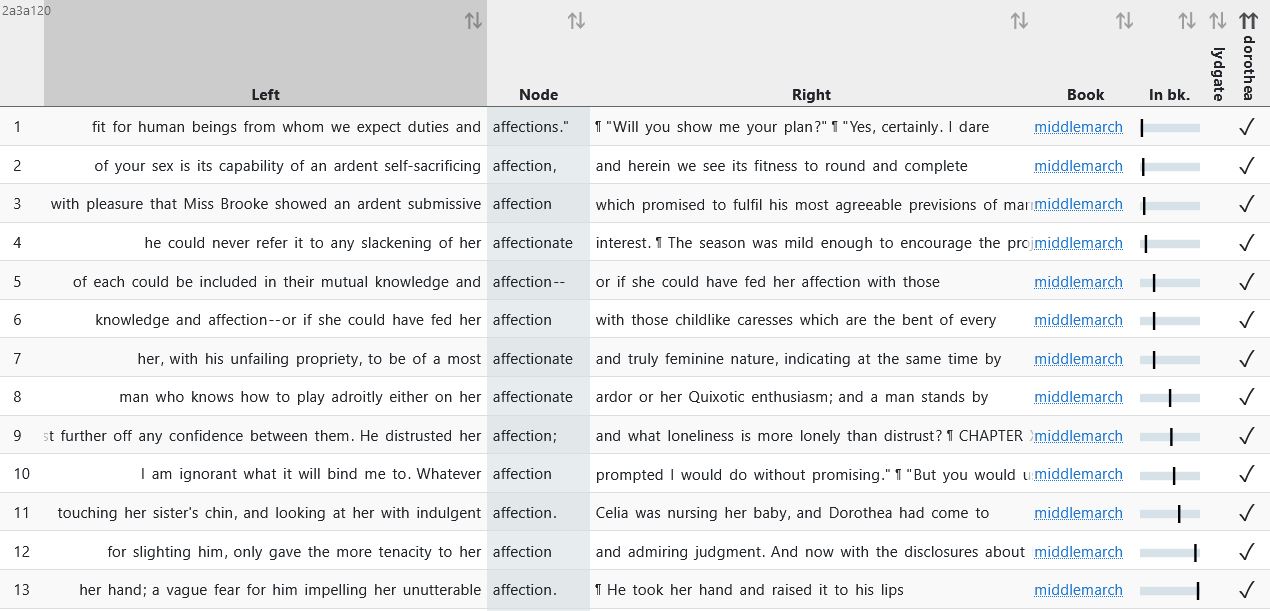
From the start, we know of Dorothea’s trust in “human beings from whom we expect duties and affections”. Her future husband, Mr Casaubon, in a letter characterised by “frigid rhetoric”, declares that he finds in her “those qualities which I have ever regarded as the characteristic excellences of womanhood”, meaning “its capability of an ardent self-sacrificing affection”. After proposing to her with a letter so tortuously scholarly it is barely understandable, “he observed with pleasure that Miss Brooke showed an ardent submissive affection which promised to fulfil his most agreeable previsions of marriage”.
For all his lack of experience in matters of affection, Casaubon does pinpoint the three main traits of Dorothea’s character: affection, submission, and ardor. The words “ardent” and “ardor”, in particular, are among the keywords of the novel. When comparing the two 1-grams in Middlemarch (All text) against the 19th Century Reference Corpus (All text), we have log-likelihood values of 55,54 and 67,4 (Fig. 4), both highly significant if we consider that for a p-value cut-off of 0.0001 the critical value is 15.13 (Rayson et al 2004). Moreover, instances of “ardent” and “ardor” mainly refer to Dorothea.

Accordingly, in the weeks of their courtship, “Dorothea’s joyous grateful expectation was unbroken, and however her lover might occasionally be conscious of flatness, he could never refer it to any slackening of her affectionate interest”.

As for Casaubon’s affection (Fig. 5), in that same convoluted letter, he confessed that
in the first hour of meeting you, I had an impression of your eminent and perhaps exclusive fitness to supply that need (connected, I may say, with such activity of the affections as even the preoccupations of a work too special to be abdicated could not uninterruptedly dissimulate); and each succeeding opportunity for observation has given the impression an added depth by convincing me more emphatically of that fitness which I had preconceived, and thus evoking more decisively those affections to which I have but now referred.
For modern readers, Casaubon’s letter is particularly striking for the sheer comic rigidity of its prose as well as his evident self-absorption: he evidently doesn’t really care about his future wife’s affection, but only wants to satisfy his own “activity of affections”. His deployment of such vocabulary (see also, her “fitness to supply that need”) suggests a commercial rather than emotional exchange. The narrator comments here on Dorothea’s reception of the letter with a rhetorical question: “How could it occur to her to examine the letter, to look at it critically as a profession of love?” (a technique designed to arouse empathy in the reader). Casaubon’s solemn tone, the pseudo-academic language that positions Dorothea less as a prospective wife and more like a candidate for a job, leaves her “with a childlike sense of reclining, in the lap of a divine consciousness which sustained her own”. To satisfy her ardor, the young woman needs “a husband who was above [her] in judgment and in all knowledge”.

In return for her accepting him as her husband, Casaubon explains in his letter that he can “at least offer you an affection hitherto unwasted”. “Poor Mr. Casaubon”, the narrator remarks, “had imagined that his long studious bachelorhood had stored up for him a compound interest of enjoyment, and that large drafts on his affections would not fail to be honoured”. Here Casaubon’s affection is framed in financial terms as a “compound interest” waiting to be honoured. Once again, the narrator’s purposeful introduction of grotesquely inappropriate lexical fields effectively calls into question Casaubon’s capacity to experience romantic affection altogether.
Perhaps Dorothea might have succeeded in arousing such affection in him, the narrator ruminates, had the clergyman “given her the same sort of intimacy in return”:
[But] These characteristics, fixed and unchangeable as bone in Mr. Casaubon, might have remained longer unfelt by Dorothea if she had been encouraged to pour forth her girlish and womanly feeling–if he would have held her hands between his and listened […] if she could have fed her affection […] if he would have made any other sign of acceptance than pronouncing her, with his unfailing propriety, to be of a most affectionate and truly feminine nature.
As is evident in this passage, “If” clauses are frequently evoked in Middlemarch (228 occurrences), mainly in the 2-word cluster if he (166) while the 4-word cluster if he had been (with 28 occurrences) appears second in order of frequency (Fig. 7). Both Eliot’s narrator and her female characters, it seems, share an ideal vision of how relationships could or should develop, while at the same time regretting that this is impossible due to perceived shortcoming on the part of the male characters. Notably, if she appears 104 times, but, unlike the other two ‘if’ clusters, does not appear as one of the 2-gram keywords in the novel.

Ironically, the only affection that Casaubon manifests is an “affection of the heart”, that Doctor Lydgate believes to have been the cause of his heart attack. His illness changes Casaubon’s attitude towards those same feminine qualities he had previously admired in Dorothea, who he now considers “ready prey to any man who knows how to play adroitly either on her affectionate ardor or her Quixotic enthusiasm”. Arguably, this is what he himself has done, but the man he fears, of course, is his young cousin Will Ladislaw. As a result of these ruminations, Casaubon begins to distrust “her affection” and decides not to reveal to her how serious his health condition is. From now on, the plot revolves around this bitter mutual distrust. When Casaubon asks his wife whether, in the case of his death, she will carry out his wishes, she answers that “Whatever affection prompted I would do without promising”. She is asking him to trust her affection, but he fears she “would use [her] own judgment”. From that moment, Dorothea’s affections will be addressed to other people: she will look at her sister Celia “with indulgent affection”, and, in order to right the wrongs done by her husband, she will turn “her affection and admiring judgment” towards Will, to the extent that “a vague fear for him [impels] her unutterable affection”.
Mrs and Mr Lydgate: affection or deluded projection?
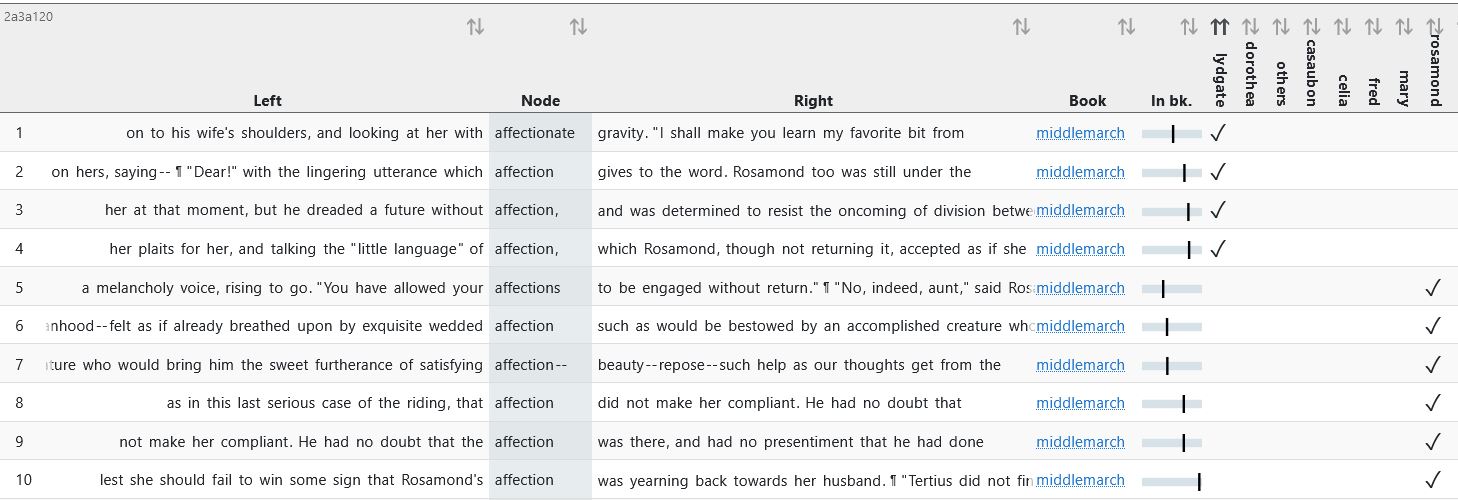
Lydgate, another major protagonist, looks “with affectionate gravity” at his wife Rosamond, calling her “Dear!”, the narrator tells us, “with the lingering utterance which affection gives to the word”, and “talking the ‘little language’ of affection, which Rosamond, though not returning it, accepted as if she had been a serene and lovely image, now and then miraculously dimpling towards her votary” (Fig. 8).
In the case of both Casaubon and Dorothea and Lydgate and Rosamond, Eliot uses the word “affection” to alert the reader to its absence, misdirection, or lack of reciprocity — revealing the instability at the heart of both relationships.
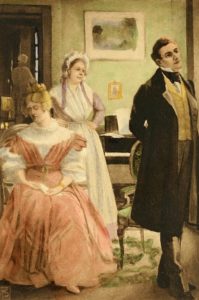
When her aunt warns her that she may “have allowed [her] affections to be engaged without return”, Rosamond dismisses the idea, believing that “no one could be more in love than she was”. On the other hand, we are informed by the narrator that Lydgate believes he has found “perfect womanhood” and feels “as if [he has] already [been] breathed upon by exquisite wedded affection”. Once again Eliot evokes if, but this time in the cluster as if he – a projection — on Lydgate’s part —regarding the happiness of their future marriage, which amounts to little more than wishful thinking. This cluster, occurring 69 times in the novel, acts as the linguistic correlative of the idealistic drive of the main male characters — all deluded by preconceived notions of “perfect womanhood”.
Lydgate thinks of his wife as “a creature who would bring him the sweet furtherance of satisfying affection”. To his astonishment, he later finds that “affection did not make her compliant”, though he “had no doubt that the affection was there”. After all his attempts to curb their spending, he finds himself dreading “a future without affection, and [is] determined to resist the oncoming of division between them”.
Mary Garth and Fred Vincy: when one’s affection meets another’s

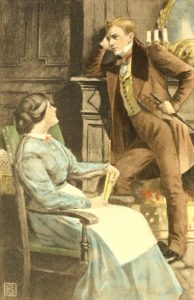
The third main couple in Middlemarch, Mary Garth and Fred Vincy, seem the most balanced in terms of affection (Fig. 10). At the beginning of the novel Mary does “not know how affectionately indignant [Fred] had felt on her behalf”. But, the narrator informs us, Fred “was certainly an affectionate fellow” and through all the stages of his education “he had kept his affection for the Garths” – not just for Mary, but for her whole family. As with Dorothea’s affection for her high religious ideals, Fred’s affection for Mary, assumes an “increasing ardor […] inclining him the more towards those who belonged to her”, so much so that Mary’s father echoes the narrator in considering him “an open affectionate fellow”. As Farebrother explains, “wisdom is not [Fred’s] strong point, but rather affection and sincerity”.
We learn from the narrator that “Mary earnestly desired to be always clear that she loved Fred best.” For “when a tender affection has been storing itself in us through many of our years”, they go on, “the idea that we could accept any exchange for it seems to be a cheapening of our lives.” We also hear about Mary’s feelings from Farebrother, who counsels “when the state of a woman’s affections touches the happiness of another life – of more lives than one – I think it would be the nobler course for her to be perfectly direct and open”. Following a poignant silence in which Mary briefly entertains and then dismisses the idea “his words had reference to himself”, she ardently makes her affections plain:
Since you think it my duty, Mr. Farebrother, I will tell you that I have too strong a feeling for Fred to give him up for anyone else. I should never be quite happy if I thought he was unhappy for the loss of me. It has taken such deep root in me– my gratitude to him for always loving me best, and minding so much if I hurt myself, from the time when we were very little. I cannot imagine any new feeling coming to make that weaker.
Dorothea and Mr Ladislaw: an unusual feeling
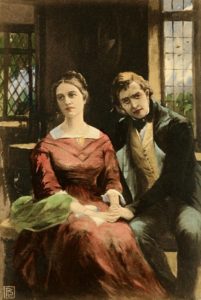
With regard to Will Ladislaw, Lady Chettam observes, “It is difficult to say what Mr. Ladislaw is, eh”. The affection between him and Dorothea is not easy to detect and is perceived by Lydgate as an “unusual feeling”, whereas the doctor starts wondering about Dorothea’s “love[, which] might help a man more than her money”. Will is the object of Casaubon’s and Sir James’s contempt, no doubt because both see him as a threat. Unlike them, he speaks and acts “impetuously”, blushes and even gnashes his teeth; in short, he reacts physically to Dorothea’s ardor, perhaps a more reliable indicator of affection than the deployment of the word. Ladislaw’s lack of spoken affection is likely a result of the circumstances of his first meeting with Dorothea shortly before her marriage with his second cousin. Even then, Will, always quick-tempered, “did not feel it necessary to smile, as if he were charmed with this introduction to his futuresecond cousin and her relatives; but wore rather a pouting air of discontent”.
Concluding Remarks
Examining the textual contexts in which forms of the word affection occur, allows us to see how the novel presents different kinds of affection, particularly in cases where its use is ironic to suggest an absence of feeling. Of the four central relationships, it is clear that Mary and Fred’s relationship is the most mutually affectionate. In the other three cases, one person is more affectionate than the other: Dorothea’s affection, which, as “a mere victim of feeling”, she seems to be in thrall to, surpasses both Casaubon’s, (since he has none), and Ladislaw’s, (who never expresses “the unspeakable content in his soul”).
Under “the pressure of various feelings, in which there was much affection and some vexation”, Middlemarch intimates the simpler affection is possibly the “rough but well-meaning affectionateness of a brother” or the “indulgent affection” of a sister, feelings which do not require the energy and ardor otherwise necessary, in Eliot’s view, to sustain our emotions. Perhaps it is in one’s family of origin, more than in marriage, that the “trappings of gender” (White 2022) can be overcome. Certainly, it is interesting that Mary and Fred, who have known each other since early infancy, often seem to have more a sibling than a romantic affection. One is reminded that Eliot is surely unique in having dedicated a sonnet sequence not to a lover, but to her brother.
References
- “affection, n.1.” OED Online. Oxford University Press, September 2022, www.oed.com/view/Entry/3344. Accessed 20 November 2022.
- Christoff, A. (2010). The Weariness of the Victorian Novel: Middlemarch and the Medium of Feeling. English Language Notes, 48 (1), 139-154. doi: https://doi.org/10.1215/00138282-48.1.139
- Eliot, G. (1856). ‘The Natural History of German Life’. Westminster Review, LXVI, 51-79. Available here.
- Eliot, G. (1874). Middlemarch: A Study of Provincial Life, W. Blackwood and Sons.
- Ermarth, E. D. (1985). George Eliot’s Conception of Sympathy. Nineteenth-Century Fiction, 40 (1), 23-42. https://doi.org/10.2307/3044834
- Greiner, R. (2009). Sympathy Time: Adam Smith, George Eliot, and the Realist Novel. Narrative, 17 (3), 291–311. http://www.jstor.org/stable/25609372
- Lowe, B. (2007). Introduction: Critical Missiles and Sympathetic Ink. In Victorian Fiction and the Insights of Sympathy: An Alternative to the Hermeneutics of Suspicion (pp. 1-22). Anthem Press. doi: https://doi.org/10.7135/UPO9781843317746.001
- Mahlberg, M., Stockwell, P., Wiegand, V. and Lentin, J. (2020) CLiC 2.1. CorpusLinguistics in Context, Available at: https://clic.bham.ac.uk/
- Rayson P., Berridge D. and Francis B. (2004). Extending the Cochran rule for the comparison of word frequencies between corpora. In Volume II of Purnelle G., Fairon C., Dister A. (eds.) Le poids des mots: Proceedings of the 7th International Conference on Statistical analysis of textual data (JADT 2004), Louvain-la-Neuve, Belgium, March 10-12, 2004, Presses universitaires de Louvain, pp. 926-936. Available here.
- White, R. (2022) ‘I know no speck so troublesome as self’: Finding Middlemarch through Corpus Linguistics [Blog post]. CLiC Fiction Blog, University of Birmingham. Retrieved from [https://blog.bham.ac.uk/clic-dickens/2022/03/31/finding-middlemarch-through-corpus-linguistics/]
Please cite this post as follows: Gallitelli, E. (2022)’Words of affection in George Eliot’s Middlemarch’ [Blog post]. CLiC Fiction Blog, University of Birmingham. Retrieved from [https://blog.bham.ac.uk/clic-dickens/2022/11/23/affectionmiddlemarch/]

Join the discussion
0 people are already talking about this, why not let us know what you think?